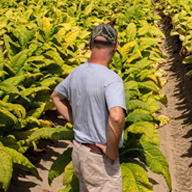
Grower Support &
Agricultural Sustainability
These efforts support business continuity for our operating companies and address societal expectations to drive responsibility through our value chain, support our people and communities and protect the environment.
Through internal and external programs and partners, the Leaf Procurement team sets expectations, trains and educates, monitors compliance and remediates issues.
Partnering for Excellence
We proactively engage with several key agricultural industry partners to collaborate on emerging trends in the tobacco growing community and encourage responsible farming practices, both in the United States and internationally.
One of our longest-running partnerships is with the U.S.-focused organization, GAP Connections (GAPC). GAPC is a nonprofit agricultural organization with more than 4,500 active grower members nationwide. GAPC aims to elevate standards in the tobacco industry.
Through their Tobacco Certification programs, GAPC prioritizes safety and compliance by providing annual training, education, self-assessments, certification audits and conducting site visits to grower operations. As a result of this collaboration, more than 1,800 growers were certified in 2024 and cultivated more than 160,000 acres.
“A sustainable tobacco supply chain is critical to our business and our values as a Company. This first starts with a solid business relationship with our contracted grower base, which we strive to achieve through fair dealing, consistent grading, and competitive pricing. Also, to ensure we have a compliant supply of tobacco, we assist our grower base with the costs of targeted programs like H-2A1 Temporary Agricultural Workers and GAPC certification.
All these efforts combine to further support achieving a sustained supply of tobacco, protection of worker’s rights and the protection of the environment.”
Wilson, Domestic Purchases, ALCS
Establishing Best Practices with the Grower Base
To expand our growers’ knowledge of best management practices, we require annual training in the three pillars of crop, environmental, and labor management practices based on the most current information from GAPC, university extension specialists and the Department of Labor.
Through collaboration and continuous support from our Leaf Procurement team, 100 percent of Altria’s contracted growers participated in GAPC’s Tobacco Certification Program in 2024.
Contracted Grower Base Monitoring
In our domestic tobacco supply chains, on-farm monitoring is key to achieving continuous improvement by identifying areas for greater focus and, if needed, remediation. Monitoring facilitates conversations with our growers around best management practices that positively impact their crop, their farm, the environment, and their workers. Contracted growers provide documentation of their crop management records, pesticide records, conservation and labor details. Those with hired labor are assessed against relevant labor management laws or higher standards as contractually required.
Monitoring activities are conducted annually by a third-party auditor as part of the GAPC Certification requirement. This monitoring is complementary to Altria employee visits to each of the contracted grower operations. Relevant grower records, such as workers’ wages paid, reimbursement of workers’ H-2A travel fees and certifications for workers’ housing2 are all reviewed as part of these monitoring activities. For our contracts with tobacco growers, we meet and often exceed the law for certain provisions because we believe it is the right thing to do. For example, the contracts:
- establish a minimum employment age of 16, with limited exceptions granted based on local, state and federal laws;
- require parental/legal guardian consent for those under 18 who want to work on the farm; and
- require growers to take GAP training on a range of topics including:
- preventing Green Tobacco Sickness and heat stress;
- keeping compliant wage records; and
- preventing human trafficking.
We contract domestic growers through our Tobacco Leaders Program on behalf of Philip Morris USA and U.S. Smokeless Tobacco Company, sourcing the three major types of tobacco – flue cured, dark and burley. Since 2021, our domestic grower base participates in the GAPC Certification program where a third party conducts an on-farm audit of their tobacco production practices.
TLP Grower Participation in GAPC Certification Program
| Year | % of Grower Base Participation | % of Program Participants Achieving Certifications |
| 2022 | 100% | ~98% |
| 2023 | 100% | ~97% |
| 2024 | 100% | ~99%* |
* In 2024, 13 contracted growers did not achieve certification. Nine of those were removed from our supply chain before marketing leaf. Four were denied certification and Corrective Action Plans were implemented to allow leaf marketing.
The program is a continuous monitoring two-year cycle with all assessments completed by a third-party auditor and governed by the GAPC Compliance Guide. In year one, growers must participate in a full, on-farm audit, including worker interviews. In year two, growers complete a site visit without worker interviews.
You May Also Like







